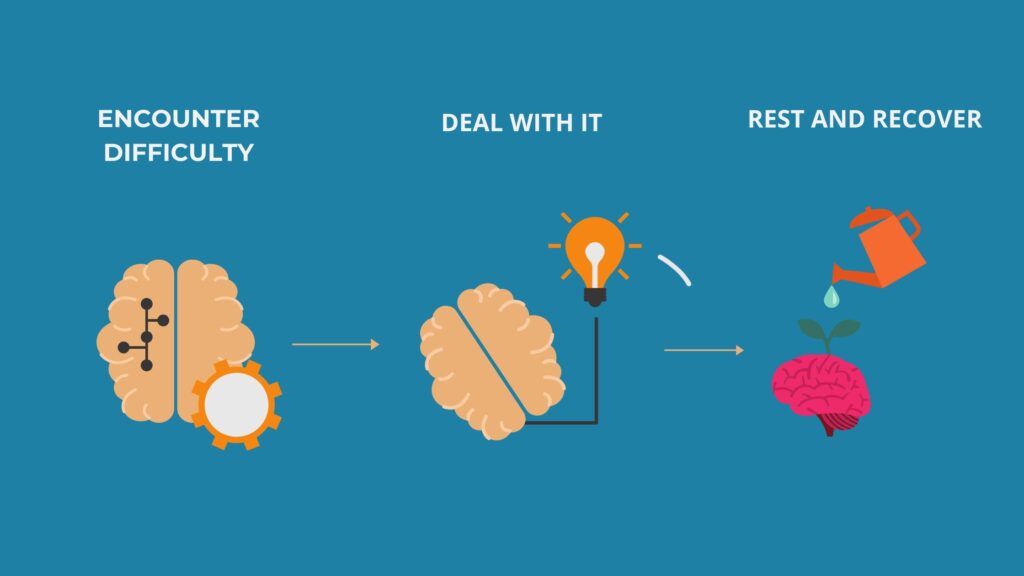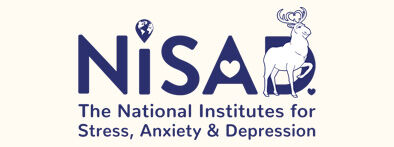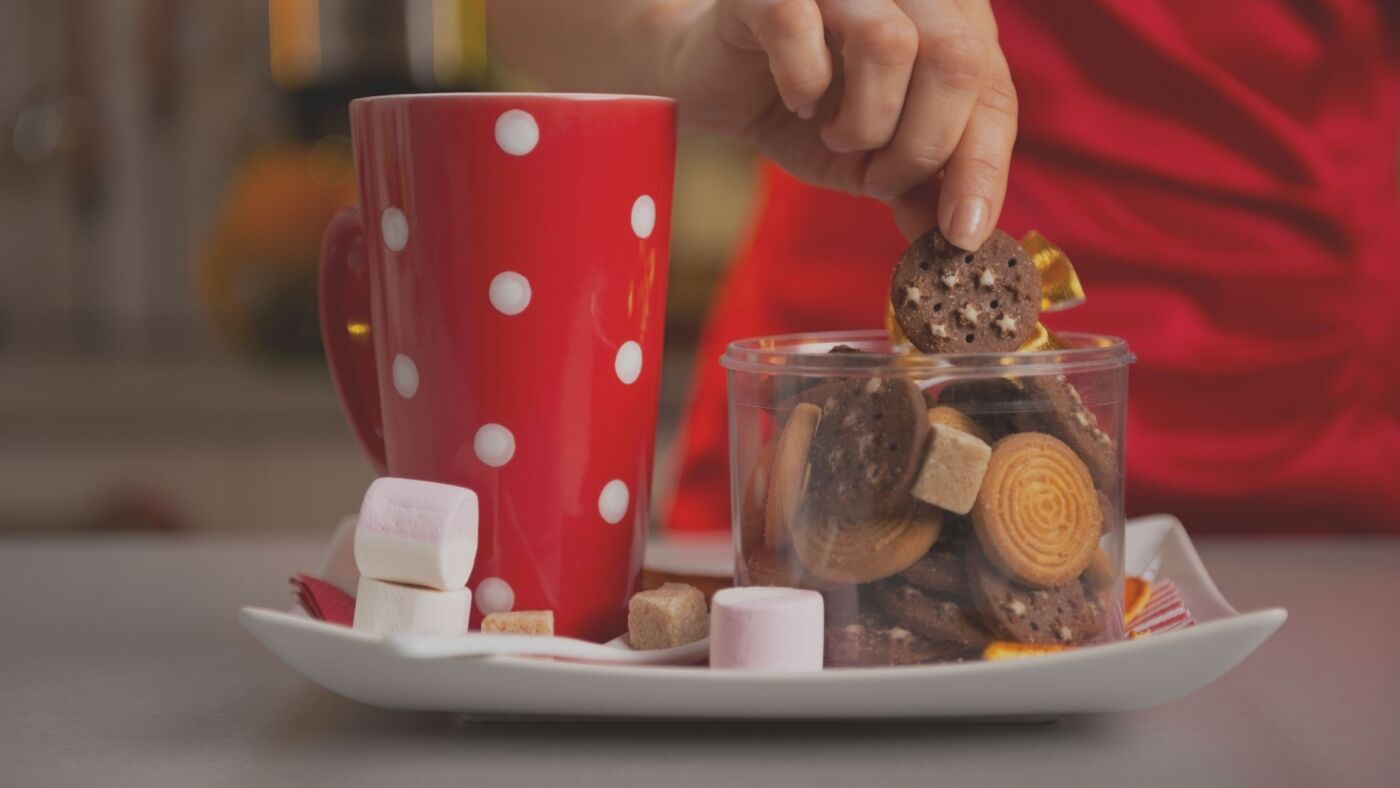If you’ve found yourself snacking more because of the current situation, you’re not alone.
As the weeks of lockdown have pressed on, many people report having watched their waistlines expand.
In our earlier posts, we’ve looked at what we can do if we’re tempted to snack because we’re at home busy working or, the opposite, at home and feeling bored.
But what if it’s stress or anxiety that’s driving us to the biscuit tin?
Comfort-eating is something many of us resort to for a pick-me-up if we’re feeling stressed, upset or anxious. And there’s a good reason for this.
Stress leads the gut to increase the production of ghrelin. Although it sounds like some kind of intestinal goblin, ghrelin is a hormone that is most commonly known for being produced when our body is low on nutrients and energy to make us feel hungrier.
This would have been useful in our caveperson world as it stimulates us to go and seek food, protecting us from starvation. You can read more about ghrelin’s effect on hunger here.
But that’s not the whole picture. Scientists are uncovering more roles that ghrelin plays. One of these, interestingly and importantly, is that ghrelin also reduces anxiety and depression.
So, the production of ghrelin in our gut decreases our anxiety, yet it also increases our appetite.
Ghrelin stimulates the release of dopamine in the brain by triggering neurons involved in pleasure and reward pathways. And we find ourselves salivating as we think of what’s in the fridge…
Still not quite the whole picture
Our bodies are complex and amazing.
There is another part of us involved in this gut-brain communication system: the vagus nerve.
This powerhouse of a nerve wanders through our body, from the brainstem to abdomen, regulating the functions of our internal organs – such as digestion, heart rate, respiratory rate – and even reflex actions – such as coughing, sneezing and vomiting. It sends signals from our gut and our organs to our brain, and vice versa. So, as well as sending messages directly to our brain, ghrelin also uses this network, to send message indirectly via the vagus nerve. And our brain sends messages, in the other direction, to our gut.
Why does that matter?
Modulating the vagus nerve has been shown to have relaxing and anti-inflammatory properties. This means it can help us to relax as well as reduce inflammation in the body so that we are mentally and physically healthier; so that stress is reduced and we feel calmer.
Certain activities, and among them eating, have been shown to stimulate the vagus nerve and help us to relax.
In addition to this, studies are also suggesting that vagal tone can influence food intake and body-size. Although more research is needed (particularly on the possible effect of excess body-fat on our receptivity to vagal signals), certainly, in animal studies stimulation of the vagus nerve has been associated with ‘weight loss’ and decreased appetite.
What does this mean for us?
The modern lives we lead have the potential for many stressors. Our bodies are designed to deal with stress but this design includes having periods of rest and recovery.

If we are constantly dealing with stressors, with no time for rest or recovery, it drains our energy reserves and makes us feel less able to cope with stress. This can increase our appetite and make us turn to food for comfort or energy. Particularly, as eating is associated with stimulating the vagus nerve to help us relax.
So, making time to take care of ourselves is essential. And if we can do things (other than eating) that stimulate our vagal tone this can help us to relax and decrease our food intake.
You can read more about the vagus nerve here
Stimulating vagal tone can be as simple as incorporating some of these 10 things into your day:
1. Breathing
You can do this anywhere! Pause from what you’re doing, close your eyes if you want to, and focus on slow breaths from deep down in your stomach. Breathe in through your nose and exhale even more slowly through your mouth.
2. Meditation
There is no right way or wrong way of doing meditation. It’s simply the practice of doing it that makes a difference. Meditation has been shown to reduce cortisol levels and inflammation. The more you can do the better, but even regularly taking 5-10 minutes to meditate can have a positive effect.
3. Yoga
Bring some gentle movement to your meditation and feel the physical benefits too.
4. Exercise
If we’re feeling particularly stressed, exercise can be really helpful in managing the stress response. After all, if we are stressed, our body is gearing up to do something! If you’re short on time, even a quick burst of something can help.
5. Singing
More than just a workout for the lungs, singing has been shown to have a positive effect on vagal tone and our mental wellbeing. If you feel too shy to belt it out, a hum or a chant can do too.
6. Music
Whether we want to slow our breathing and relax, dance around, run up and down, hum or sing along, music can get us doing these things before we even decide to!
7. Laughter
Just think how good you feel after a bout of laughter. Whatever tickles your funny bone, will tone your vagal nerve.
8. Crying
Ever wondered why some of us love watching a good weepy? Or why, when we feel stressed or upset, we can feel better after a good cry? Among other things, the after-effect of crying can include modulation of vagal tone.
9. Social connection
When we connect enjoyably with others, we send and receive signals via our eyes, gaze, smile and vocal expression, which tell our brain that we’re safe. In lockdown, a video call can have the same effect.
10. The great outdoors
When we view blue spaces (e.g. lakes, sea, rivers) and green spaces (e.g. gardens, countryside, parks) this helps to calm our nervous system and modulate our vagal tone so that we feel more relaxed. If we’re not able to get out of the house, even looking at pictures can be beneficial.
As scientists continue to grow our understanding of the links between stress, snacking and excess body-fat, it’s becoming ever more clear that how we manage our stress matters.
Happily, in these lockdown days, we can begin taking care of ourselves and reducing our stress without even leaving the house.
At NoWeigh, we understand the challenges of becoming and staying the size we want to be, and how to navigate them.
Keep in touch for information about developments in our clinics and programmes.

Alison Easton
Director of Clinical and Creative Development at NISAD
BA(Hons) HPD DipCHyp


